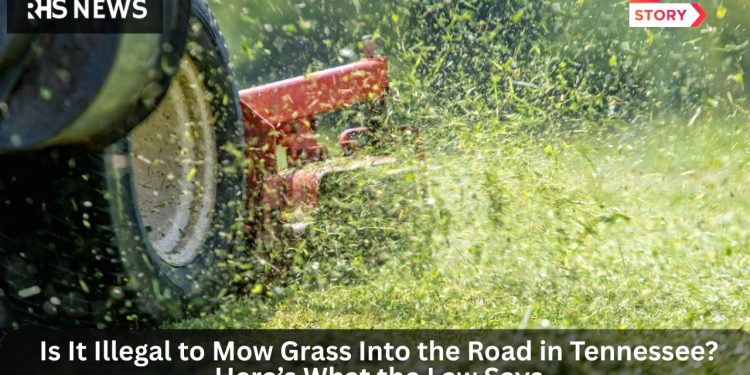Every spring and summer, Tennessee’s residents proudly maintain their lawn landscapes, from the vibrant suburbs of Knoxville to the country homes dotted across rural Shelby County. Yet, a common practice—mowing grass and allowing clippings to be blown into the street—raises not only aesthetic but also serious legal and safety concerns in cities like Nashville, Memphis, and Chattanooga.
The story isn’t new. Across Tennessee’s busy thoroughfares and quiet residential streets, this seemingly minor act has triggered heated debates among homeowners, motorcyclists, and city officials alike. The risk primarily lies with motorcycle riders and bicyclists. Grass clippings can create dangerously slippery surfaces, leading to avoidable accidents on Tennessee’s roads.
Understanding the Legal Landscape in Tennessee
The laws around mowing grass into the road in Tennessee aren’t as straightforward as you might think. While there’s no statute specifically mentioning grass clippings, state law does address the deposit of hazards and debris onto public roadways.
Tennessee Code Annotated (T.C.A.) § 55-8-170 makes it illegal to throw or deposit “any glass bottle, glass, nails, tacks, wire, cans or any other substance likely to injure any person, animal or vehicle upon the highway.” While grass clippings aren’t explicitly listed, they are considered a hazard—especially to motorcyclists and bicyclists. Letting clippings accumulate on roads can reduce traction, potentially leading to accidents and injuries.
In the Nashville suburb of Coopertown, the local police department highlights that it’s not just about courtesy but also about public safety. Grass clippings have been cited as a contributing factor in motorcycle crashes, leading lawmakers and officers to urge residents to keep their clippings off the road. Violating these laws means a Class C misdemeanor, and in cities like Coopertown, you could face a fine of $50 plus court costs if found responsible for this hazard.
The Dangers of Grass Clippings on Tennessee Roads
Grass clippings might seem harmless, but their impact on road safety can be significant. Motorcyclists are particularly vulnerable. When grass accumulates in the roadway, it creates slippery conditions that can lead to skidding and loss of control. The National Highway Traffic Safety Administration has reported that thousands of motorcycle accidents nationwide are attributed to road debris, including grass clippings.
In cities like Murfreesboro and Franklin, local riders have voiced concerns over this issue, citing near-miss experiences and accidents. According to Tennessee Highway Patrol reports, accidents linked to roadway debris—grass included—have increased by around 12% over the past five years in Davidson County. Even for cars, sudden braking or swerving to avoid grass piles can cause fender benders and more serious crashes.
Why Is Mowing Grass Into the Road a Problem?
The dangers of grass clippings on roadways are not just theoretical:
-
Motorcycle Safety: Clippings, especially wet ones, are notoriously slippery. Motorcyclists have reported accidents after hitting patches of grass, sometimes with serious injuries. The Motorcycle Safety Foundation and other advocacy groups highlight this risk annually during peak mowing season.
-
Storm Drain Blockage: Grass clippings can clog storm drains, leading to local flooding during heavy rains. This is a particular concern in urban areas with older infrastructure, such as parts of Memphis and Nashville.
-
Environmental Impact: While not a primary concern under most Tennessee laws, excess grass can contribute to nutrient runoff into waterways, potentially affecting local ecosystems. Some cities nationwide have banned the practice for environmental reasons, though Tennessee municipalities have not widely followed this trend.
-
Liability for Homeowners and Landscapers: If your grass clippings cause an accident, you could be sued for negligence. This is true even if no specific law exists in your city—general principles of tort law apply, and courts have found property owners liable in other states for similar hazards.
Liability and Civil Consequences
Even if you escape criminal penalties, letting your grass enter the road can expose you to civil liability. Should an accident occur—whether in Nashville, Bartlett, or Johnson City—homeowners or professional mowing companies could be sued for negligence, especially if it’s proven the grass clippings directly led to property damage or personal injury.
Lawn care professionals operating in Tennessee must remain cautious. Industry experts emphasize documenting work, training crews on proper mowing practices, and promptly clearing the road after each job. In 2024, a Clarksville-based landscaping company faced a $7,000 lawsuit involving a motorist injured after skidding on grass clippings purposely blown onto a busy thoroughfare.
Protecting Tennessee’s Roads: Best Practices for Homeowners
To remain compliant and courteous, Tennessee residents are encouraged to adopt best mowing practices:
-
Mow with the discharge chute facing away from the road, ensuring clippings remain on your lawn instead of adjacent streets.
-
Use bagging attachments or mulching blades to minimize loose clippings.
-
Sweep or blow clippings back onto your yard or gather them for composting after each mowing session.
-
Educate family members and employees on mowing regulations, especially if you maintain larger properties or manage a landscaping crew.
Residents in Germantown, Hendersonville, and Kingsport regularly organize community “clean-mow” events, raising awareness and promoting responsible yard maintenance. These initiatives have reduced debris-related complaints by 18% in Blount County in the last year.
Enforcement and Penalties Across the State
Though seldom strictly enforced, local police departments in Springfield and Cleveland periodically issue warnings and citations to violators. Reports from Spring Hill’s Code Enforcement unit show about 25 citations were issued in 2024 alone for roadway hazards, including grass clippings and other yard debris.
The relevant statute, Tennessee Code Annotated §55-8-170, prohibits individuals from throwing or depositing “any glass bottle, glass, nails, tacks, wire, cans or any other substance likely to injure any person, animal, or vehicle upon the highway.” Local ordinances—such as those enacted in Coopertown (near Nashville)—make mowing grass into the street a violation, regarded as a hazardous act punishable by fines, especially if it leads to an accident or damages. The penalty in Coopertown, for instance, is a $50 fine plus court costs.
This means that in Tennessee, blowing grass into the road is not simply inconsiderate—it is usually illegal and may leave the homeowner liable for any resulting damages.
Community Voices: Tennessee Residents Speak Out
Local media often highlight the dangers associated with mowing grass into the road. Motorcycle advocacy groups in Nashville and Memphis campaign for increased public awareness, sharing personal stories and accident statistics to press home the importance of keeping roadways clear.
Public opinion also shapes policy, with homeowners associations and city councils in places like Collierville enacting stricter waste management rules. Social media channels buzz each spring and summer with reminders to keep lines of communication open and prioritize neighborly responsibility.
Conclusion
Allowing grass clippings to accumulate on Tennessee’s roadways is more than just a minor inconvenience; it’s a safety hazard that can result in legal trouble for homeowners and lawn contractors alike. From rural towns to bustling cities like Memphis, Nashville, and Chattanooga, residents are increasingly aware of their responsibilities. Tennessee law makes it clear: you may face penalties, and even legal liability, for failing to keep roads clear.
The best step forward is proactive care—mow responsibly, clean up thoroughly, and educate your neighbors. Cities and towns across Tennessee offer plenty of resources and support for homeowners ready to do their part. Whether protecting motorcyclists in Knoxville or safeguarding Memphis’s waterways, addressing grass clippings on roads is essential for a safer, cleaner, and more lawful Tennessee.









